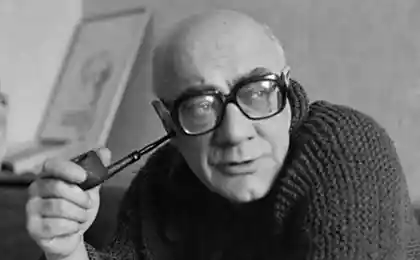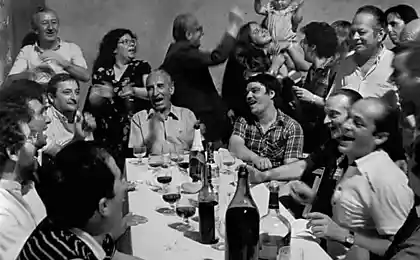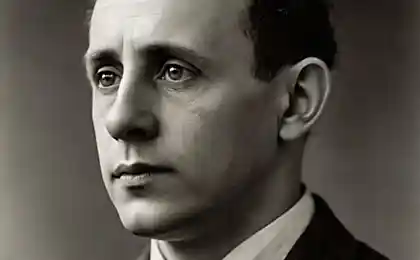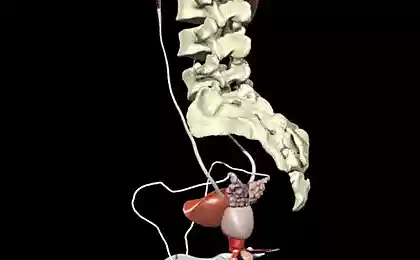593
Merab Mamardashvili: the overcoming of the seeming of life

photo: Igor Palmin
He was stricken the appearance. Never anything not directly throwing the challenge, not breaking any part, he simply — and very naturally — lived as if this framework was not.
He could still be alive today, if not feel not belonging to any of the times. If not looked at every time and place from the outside, from the point of the absolute. However, our time this view would only be useful. Now people with this opinion seem to have gone. Them and then was not: Mamardashvili was such a one. In Russia and Georgia, and in the Europe which he loved, in which I learned a lot — and that did not go to live and work, although his name was. When his "failure to plan" — was fired from the Institute for the history of science and technology, and then stripped and Department of VGIK, he was invited to Milan and Paris... No, refused, went to Georgia. Just because there it was much needed. His first lecture at the faculty of philosophy of Tbilisi University he started (his former students remember them still): "I am leaving my loneliness to your orphanhood and obvorovali".Still unknown, by the way, how he would fit into the context in the same Europe. With context, not to mention the conventions and authority, he always had a complicated relationship.
"Imagine, recalled a friend Mamardashvili and publisher of his posthumous books Yuri Senokosov, — a fairly long corridor <...> you were moving towards them not coming, but it slowly moves, tall, broad-shouldered man in glasses, with a large bald head, slightly tilted forward, causing you involuntarily pay attention to it, his whole figure, as the moving skater, too, it seems as if which moved forward, although it is clearly not in a hurry, and when it passes by, before hiding on the landing, you see what he is dressed in a black sweater, he had large facial features and gaze.
This is directed under the weight of the head forward charm human figure, I remember, struck me more than anything..."
That was the first impression of their years of friendship, and it essentially has not changed.
He was stricken the appearance. Never anything not directly throwing the challenge, not breaking any part, he simply — and very naturally — lived as if this framework was not.
"His nespeshnost conspicuous, says his ex-vgikovsky student, in Moscow and in Tbilisi."
And despite the fact that he easily was able everywhere to become his. And whom exactly was, so this man is not of this world. Was a foodie, a wine connoisseur, a connoisseur of tobacco and tubes (after his death he left a collection of), constantly in love but still tried to introduce to each other their many women, sincerely hoping that those will become friends. At the end of life fell in love with eighteen-year-old and bitterly lamented being rejected.
He knew how to be friends — considering the fact that friendship is a relationship on crack. "What I mean, if you're interested, he said, is the product of solitude and silence." Loved long meal and even longer conversation. Easily taught languages: French, which was considered the language most appropriate for philosophy, English, Italian, Spanish — to read Jimenez. Considered himself a citizen of the world. France loved almost as well as Georgia, and sorry — it is there in the joke? — that might not be French.
Mamardashvili — the name of a landmark. Even for those (the majority) who could hardly really explain what was the object of his academic philosophical training. His name people 70-80 years "echoed in the darkness." He was one of the names of inner freedom (which then, in the era of external freedom, if someone forgot, was very much appreciated), one of the living and convincing evidence of her capabilities.
His book, devoid of sounding in them the living presence of the author, it is very difficult to read. Thoughts thrown at the halfway mark, incoherence, repetitions... because he is, strictly speaking, not writing, though I wrote it very much. What is now published (still published, although the date of his death passed almost 20 years!), is for the most part the decoding of the transcripts and audio recordings of his lectures. Yes, to each of them he carefully prepared, and preparatory manuscripts there are many. But really it is the thought arose — and there was — only at the moment of pronouncing.
A real event of domestic intellectual life of the twentieth centuries was in the late 70's, when I began to read public lectures.
By the time he managed to place in academic life as the official philosophy. At twenty-seven, Ph. D., in the forty — doctoral, forty-two became Professor. Moreover, he was at the very core of the Marxist ideology of his time. Worked in the editorial of the magazine "Problems of peace and socialism" in Prague, the Institute of international labor movement. In 1968 was in "Questions of philosophy" as much as Deputy editor. In 1974, however, it for ideological reasons was dismissed: it became clear that the official part of this man have nothing in common and fit into them, he never will be.
Perhaps, just starting to read his numerous lectures Mamardashvili became what it remains to this day, took his indeed an indispensable place in our culture.
The real thing that he did, and in fact it is best to do verbally.
Philosopher Mamardashvili fully became himself, when he began to refer not to a narrow circle of specialists, not to fellow philosophers, but to people in General. To everyone who is willing to listen and think, regardless of the degree of their preparedness. May be, by the way, because there is no "readiness", according to Mamardashvili, there could not be in principle. No more, no matter how much he prepared, and it was he himself: in thinking, he was sure, everything happens only here and now and only with personal effort.
One-on-one before the event in the here and now born of thought he put not only his audience but himself.
It is generally believed that philosophy — a true, "real", as he said, not philosophy "of doctrines and systems" is one. "The doctrine and system", only in different ways, each in its own way it is presented. And this "real" philosophy is and should be — if you really want to do something real to break through personal effort.
This effort is, according to Mamardashvili, forming condition and the culture in General and, moreover, the person. Without him, we will deal only with the dead forms — including forms themselves. Man, in his view, truly alive only as long as "holds" itself in being the best — effort constantly renewed and never guaranteed. No supports. No reference points. All is done now.
In essence, the philosophy, Mamardashvili is anthropological (or rather, antropologicheskaya) practice: chelovecheskaya exercise in existence. Which must be constantly renewed, if we want to remain human.
This is a special kind of "self-care", Samovodene, cultivating himself, imputed to the European individual in a kind of duty since the times of antiquity. In the version proposed Mamardashvili, is cultivation is created by thought: its the person not only thinks its object, but creates himself.
"We are able to understand what is written in a philosophical text, he said in the "Cartesian meditation" in 1981, only in that case if we can reproduce it (and said it) as a possibility of our own thinking... That is, the law is that if someone had once performed the act of philosophical thinking, then it is all that happens in philosophical thinking".
Making the audience follow him to reproduce in himself the thoughts of Kant, Descartes, Proust, as the possibility of their own thinking, he gave everyone the opportunity to awaken to their own universality "of vsechelovechnosti": pass own effort and make a fact of private life "all that happens in philosophical thinking".
A thinker like him could only arise in a post-Christian culture elaborated the Christian meanings, but kept them. In the cultural space, vistauser after Christian meanings to his left, but keeping the form they gave him. Experiencing a longing for the ethical dimension of thinking, for its ethical pathos.
He said: "the Philosophy knew and again updates in the twentieth century the feeling of one simple idea. It can be expressed as: where are we up to the new man, that is completely different some man, <...> when we don't even have what we have. <...> human being I call a creature that has committed an act of individuation. Instead of him and for him, no one can do. This means that what we empirically see as people, not a people. We have people in the extent that we have fulfilled what we potentially have a human..."
In addition to and before that he was a philosopher-a professional, raiser intellectual tradition, he has taken in our culture niche preacher for intellectuals. Led person forming the work in European societies for centuries fulfilled a religion.
He appealed directly to the human core of each of his listeners' to the fact that precedes all social and biographical definitions. To the immortal soul. (And said: "Forget that you are responsible for everything that happens in the world. You answer only to your own immortal soul.")
With only one difference: he did not preach. Not taught in the truest sense of the word. He was just thinking in the eyes of his audience, never knowing in advance what will come. He put on the experiment itself present in thought.
Mamardashvili — the philosopher par excellence — has become a phenomenon primarily ethical, and only then intellectual. Consider this a misunderstanding? I think, Yes. It is unlikely that he understood his fairly wide audience in the fullness of their meaning. But he was very badly weathered.
It seems that he was the only one, thanks to our compatriots who happened to survive the birth of thought as a personal event, a personal shock.
Of course, it is perceived and how teachers of non-conformism, and it is also correct, though incomplete. His lectures were lessons metaphysical loneliness — this understanding of loneliness and taking it as a mission.
"The whole problem of thinking is cardoctor the overcoming of the seeming of life, he said. — And this act must be repeated again and again. Apparent life haunts us in all corners of our souls and the world, and we must purge it from all angles and to do it constantly. I told you that the agony of Christ will last until the end of the world, and all this time you can't sleep".
This is, perhaps, most importantly — regardless of whether we are Christians or not: the overcoming of the seeming of life. Alone responsible, at your own risk.
About how full, almost fatal to him was the inclusion in the idea shows one case. In early 1981, remembered Yury Senokosov, Merab lectures about Descartes. Lectures began at ten in the morning. Merab was unusually punctual, not late never and nowhere. "And once all have gathered huge audience, waiting, and Merab no. Was late for forty minutes. Apologized and began to lecture". And close friends were told later that night in his dream came Descartes. They were talking. He woke up because his throat gushing blood.
Did Mamardashvili's influence on Russian philosophical thought as such? The issue is complex. There are professional philosophers who were in close contact with him, felt his strong impact and even consider themselves his disciples — for example, still alive Valery Podoroga. But each of them, in particular the same way back, makes it his own, quite far from what I do Mamardashvili. In the strict sense of the disciples, that is, the direct successors started his intellectual work, he was not. It did not create a school.
This is no accident: it is generally not conducive to discipleship.
By the way, Teachers are the only great and indispensable letters were not from him. This man was himself, might seem a mystery, if not to remember that, according to the deepest conviction of Mamardashvili, truly man creates himself by himself. So he created — starting from the material that historically happened.
"The beginning, he used to say all sorts of ignorant strongly personal circumstances, is always historical, that is, by accident." In the pitch 1949, the son of military personnel, Commissar infantry division, born in Gori — in the same city with Stalin ("...Obviously, commented Grasslands, — in expiation of his crimes"), from childhood sure is a philosopher, came to Moscow to enter the University. Can you imagine what attitude to philosophy was the fact that there is at this time there.
To learn she was not really an option even on the books. Descartes himself, along with the idealist Plato by decree of Lenin was listed in the list of banned authors. On Kierkegaard, Heidegger, Husserl, Wittgenstein can not even stutter. Had to work with what we have, and the intellectual biography of Mamardashvili and his friends, young freethinkers (and in the same time with him at the faculty of philosophy studied Georgy Shchedrovitsky, Yuri Levada, Yuri Karjakin, Boris Grushin, Alexander Pyatigorsky, Alexander Zinoviev, Evald Ilyenkov), began with Marx. No, the Commissioner's son, all College years are not time parting with the first volume of Capital, is not prepared in the party ideologues. He was not interested in the political side of things, but purely mental. Marx gave him the idea of becoming — along with Gruzinim, Zinoviev, Shchedrovitsky and one of the founders of the Moscow logical circle.
"We are the logical party of Capital, he said much later, — if you pay attention to it, and we drew was just material that we didn't need <...> to invent, it was given as a model of intellectual work".
Where the main part of contemporaries saw nothing except the unshakable ideological authority, Mamardashvili saw the problem. He was told about it decades later, then saw a "before a theoretical problem: understand what the text? What is consciousness?". "The very formulation of these issues, he explained,' answered then my anarchist aspirations, the desire to obtain freedom in life itself. I craved inner freedom, and philosophy was the tool that allowed me to achieve... [And that] I was helped by Marx. Indeed, in his youth, he started with a critique of consciousness — at the level of the critique of ideology".
Among other things the story again that it is not in texts and not in the material. And not in the teachers. And not even in the environment. Because with many of his fellow students at the philosophical faculty of Mamardashvili also significantly diverged thereafter.
He, the half-life read lectures and became famous because of it, was sure to teach that is to convey a certain ready sum of knowledge and skills in philosophy, in principle, anyone is not possible. You can only set an example, which, in turn, can be perceived or not be perceived to follow him or not to follow. And which, most importantly, each perceiver inevitably injects into the solution to their own problems. Maybe even far removed from philosophy as such. And so it happened.
In the end, Socrates, which during the life compared Mamardashvili, no school, too, not created. But a note for the records (probably free!) his pupil Plato became, as Whitehead observed, all European philosophy.
The Effect Of Wittgenstein
Ludwig Wittgenstein owe their existence at least three major intellectual currents, without which it is impossible the past century. The early Wittgenstein considers its predecessor, logical positivism, the late Oxford linguistic philosophy and American philosophy of linguistic analysis. Symptom of deficit In the late Soviet society there were two alternative mechanism for the recognition of the Humanities, each of which worked perfectly. The first official recognition, expressed in different kind of bonuses that have got loyal thinkers in the course of his career, culminating in, say, the title of academician. The second mechanism was an alternative — a different kind of critical thinkers that have not received special bonuses from the Soviet authorities, but enjoyed extraordinary popularity among the Soviet intelligentsia (the phenomenon of M. Mamardashvili). published Author: Olga Balla P. S. And remember, just changing your mind — together we change the world! ©
Source: www.chaskor.ru/article/preodolenie_kazhushchejsya_zhizni_19821?fb_action_ids=659196837438241&fb_action_types=og.recommends&fb_source=other_multiline&action_object_map=%7B%22659196837438241%22%3A431497583802%7D&action_type_map=%7B%22659196837438241%























